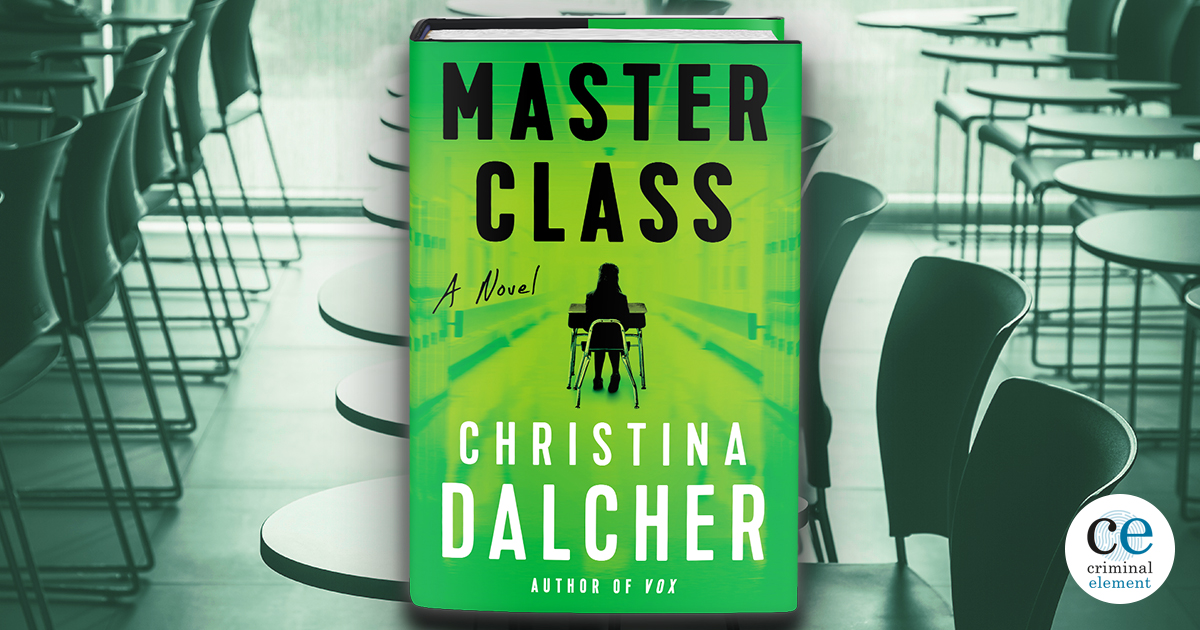Book Review: Master Class by Christina Dalcher
By Doreen Sheridan
May 5, 2020
In a dystopian near-future America, Elena Fischer Fairchild is one of those upper-middle-class women who are only too happy to be complicit in an unjust system of government until her own interests are affected. The system in question is one she helped devise as a teenager with her then-boyfriend Malcolm Fairchild. Somehow, they managed to persuade their local school board to implement an academics-only-based meritocracy in the high school they attended. The idea caught on throughout the country, then began to affect more than just the education system, with a person’s Q score—as their academic rating is known—determining what jobs and advantages and even minor perks like shorter waiting times at Starbucks they might qualify for.
As the years pass, Malcolm becomes a big deal in government, while Elena concentrates on teaching in one of the elite schools set up to serve those with high Q scores. But Elena’s commitment to the system begins to weaken even before the birth of her younger daughter, Freddie, who grows up with anxiety issues that Elena does her best to downplay in front of the increasingly cold Malcolm, who far prefers their overachieving older daughter, Anne. When the worst happens and Freddie’s low Q score relegates her to a state-run boarding school in Kansas, Elena discovers that her love for her daughter is far greater than her investment in the system that wants to tear them apart:
Maybe all mothers are semi-insane. Maybe that’s part of the deal we make when we decide to let our bodies become hosts, when we lie with our legs spread and our insides knotted in pain and push and push and push until we think we can’t push anymore, when we hold vigil during sleepless nights in rocking chairs and recliners, sweating over the slightest changes in a tiny creature’s appetite, body temperature, weight.
I was insane to come here [to Kansas]. I would have been equally insane to stay at home.
Elena’s devotion to her daughter is one of the best things about her, as is her relationship with her long-suffering parents and grandmother, Oma. Elena’s family has long disliked Malcolm, and not just because they’re decent people at heart. As German immigrants, they’ve had their own experiences with the kind of systems their son-in-law promotes, and thought they’d managed to leave that all in the past. Oma, especially, is vehement that Elena avoid any of the trappings of demarcation, even as a child:
At eight, I didn’t understand. Green shamrocks and Mexican flags were what you pinned on for holidays, Sparkling jewelry, what you got to celebrate a first communion or a bat mitzvah or the end of something called Ramadan. For the next three years, I wore what I wanted during school, making sure to hide the forbidden things in my book bag before the bus dropped me off in front of our house.
The fourth year, I stopped wearing them. It was the year Oma sat me down and told me about the colored patches.
Yellow patches. Star-shaped patches. Pink and purple and brown and black patches in the shape of inverted triangles. Bars for repeated offenders.
Despite her family’s best efforts, Elena grows up to espouse the very values they despise, even if her involvement is occasionally unwitting. When she finally comes to a political awakening and realizes that she’s paved the way for the resurgence of American eugenics—the system of dehumanizing those of low IQ or possessed of other purportedly undesirable traits—Elena must decide how much she’s willing to risk in order to save her both her daughter’s life and her own soul.
Master Class is a thought-provoking dystopian tale that highlights a shameful chapter of our country’s history and posits the likeliness of a resurgence, given the often wilful ignorance too many people in this day and age have of the past. I wasn’t convinced of much of the political writing of the book, in practice or ideology—I definitely raised my eyebrows at, among other things, Christina Dalcher’s negligence in noting the difference between the progressive movements of this century and last—but can totally get behind any effort to underscore the evils of eugenics or any other system that takes self-determination out of the hands of a country’s citizens based on anything but content of character. It was also somewhat disconcerting to have a book about particularly American systems of discrimination barely touch on race. I suppose it is comforting to think that future dystopias are mostly race-blind, given how grim they may be on all other fronts.
This is a great book for anyone who had no clue that it was American eugenicists who inspired the Nazis in their atrocities. It will hopefully serve as a starting point for thoughtful discussion and evaluation of our own current practices, so that eugenics can stay dead and buried in the past where it belongs.
